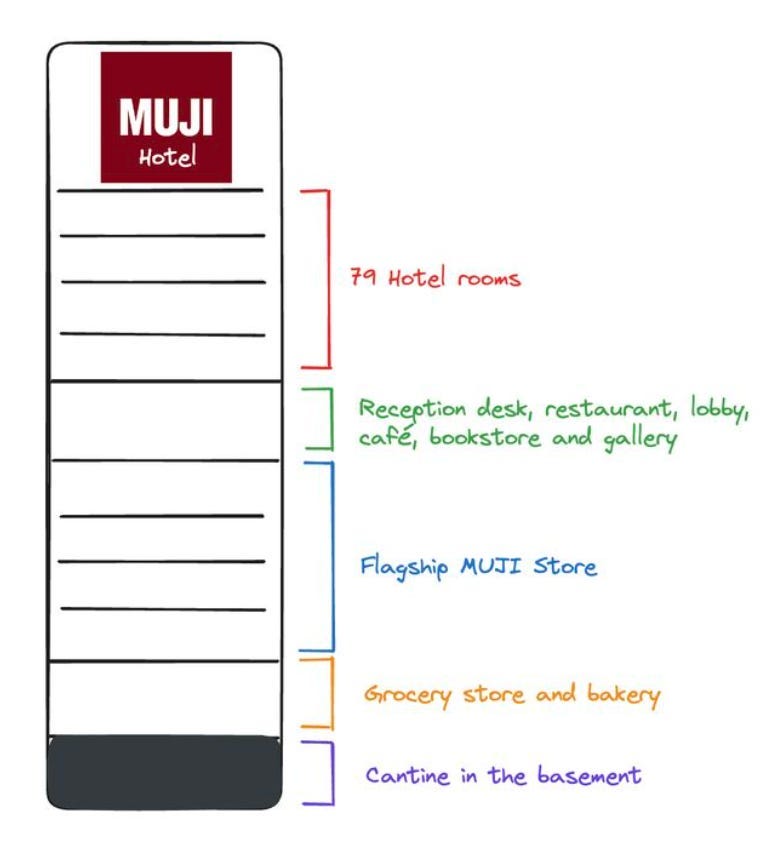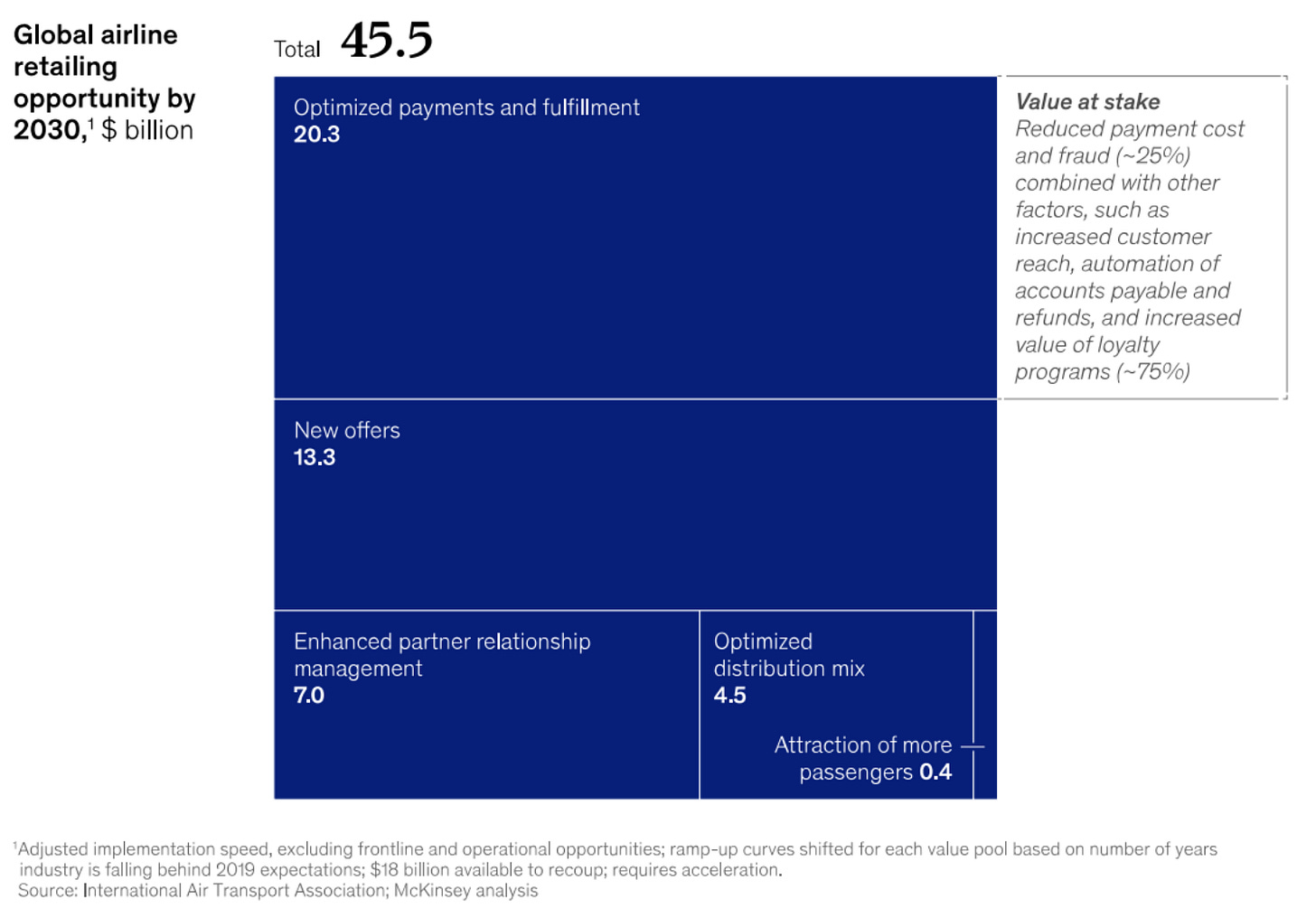Travel Tech Essentialist #157: Reimagine
“The real voyage of discovery consists not in seeking new landscapes, but in having new eyes.”
– Marcel Proust
Thanks to Propellic for sponsoring this newsletter
It's time to build your 2025 marketing plan. Find out where you need to focus with the Propellic Performance Bookings Assessment. Get a full report with marketing recommendations based on your unique situation - and you don't even need to provide your contact information. Click here to take the assessment.
0. The most clicked link in the previous newsletter
The most clicked link in Travel Tech Essentialist #156 was a first ever tie: What travel brands are really whispering (link) and the visual case on how to use scarcity to your advantage (link)
1. What if MrBeast had an airline?
A leaked 36-page document from YouTube's biggest influencer, Jimmy Donaldson, aka MrBeast, reveals the success principles of his empire. A few insights:
Simple and clear goals. The top priority being always creating the best YouTube videos possible.
Rule-breaking culture that prioritizes creativity with a non-Hollywood approach over traditional media norms.
Employees are judged on results, not time. Productivity matters more than hours worked.
Constant iteration. Everything, from camera angles to storylines, should always be improving.
A flat organizational structure that encourages growth and helps employees view their roles as long-term careers.
Creativity, not just spending, drives results.
Jose Luis Vilar, cofounder and CPTO at Caravelo, used ChatGPT to adapt MrBeast’s playbook to the airline industry. Here’s a glimpse into what a "MrBeast’s Airlines Manual” might look like.
2. Using Booking.com to identify hotel acquisition targets
Peter Fabor is using Booking.com in a unique way to spot potential hotel investments in Portugal. Inspired by advice from David Kijlstra, he’s targeting independent hotels not officially for sale but that fit a specific profile. He’s coined this approach “David’s Triangle”:
Low overall rating – Shows room for improvement.
Excellent location – Top-tier location that’s hard to beat.
Poor value for money – Suggests management issues that can be fixed.
These criteria help him identify the subset of underperforming hotels in great locations. Now it’s up to him to make one of those hotels an offer it can’t refuse.

3. How about a deluxe suite to go with your new pencil?
Peter Fabor suggests that more companies should consider having their own branded hotels, using Muji as an example. Muji’s Tokyo flagship store features a hotel on top, allowing customers to experience the brand's products firsthand. Benefits include stronger brand connection, a convenient stay option for employees and partners, a testing ground for product design, and a B2B showroom. Read +.
4. Startups are fans of in-person events
Andrew Chen from a16z shared on LinkedIn why in-person events are making a comeback, as seen with SF/LA Tech Week, which will host 1,100+ events and attract tens of thousands. He highlights a few drivers behind this shift back to IRL:
The AI boom is heavily B2B, and events remain one of the best avenues for business development.
With digital marketing channels oversaturated, in-person events offer an authentic and cost-effective way to reach new customers.
Events provide direct access to highly qualified contacts, building trust and relationships essential for major transactions, like VC funding and big partnerships.
There’s a strong desire for face-to-face interaction post-lockdown
Events are not necessarily scalable, but when it comes to quality over quantity of contacts and relationships, it’s hard to beat.
5. Local-first travel app (not as in going where the locals go)
During a six-month travel sabbatical, Jake Lazaroff grew frustrated with existing planning tools. So, in true techie fashion, he built his own: Waypoint. It’s a local-first app, not because it helps you live like a local, but because it stores everything on your device, letting you plan trips entirely offline.
Over a few months, Jake created Waypoint with Svelte and CRDTs to tackle core pain points: it’s easy to jot down notes, plot destinations, and visualize routes, all without the internet. Just type out your itinerary, and watch it appear on a map in real time. If you want to rearrange your plans, the app updates instantly, making it a great offline tool for travelers. Read more.
6. The travel industry’s next journey, planned with generative AI
Accenture surveyed over 8,000 travelers and 300 C-suite industry executives globally and complemented those surveys with a crowdsourcing exercise involving 200 travelers from four countries, along with an AI-based cluster analysis of their views. The full report is based on insights gathered in the research. In short:
The travel industry has a $28 billion opportunity to use generative AI to improve the customer experience.
Travelers find the current travel planning process to be complex and frustrating, and they want a more personalized and efficient experience.
Generative AI can be used to address these pain points by providing personalized recommendations, automating tasks, and enabling natural language interactions.
Travel companies are already starting to experiment with generative AI, but they need to overcome challenges such as data readiness and workforce training in order to scale these initiatives.
7. The end of the OTAs? (Again)
Thomas Reiner envisions a future where ChatGPT’s Advanced Voice Mode could reshape travel booking, potentially disrupting Online Travel Agencies by providing tailored, voice-driven travel recommendations. Some segments may resist AI-based bookings initially, but Reiner believes leisure travelers planning standard trips will quickly adopt voice AI for its convenience.
Reiner outlines key challenges for AI in travel booking, including access to inventory, data accuracy, service complexities, visual discovery, privacy concerns, and latency issues. He explores three scenarios: (1) OpenAI dominates, relegating OTAs to inventory management; (2) brand loyalty shields OTAs from AI disruption; and (3) OTAs leverage their proprietary data to build superior AI agents. The impact on industry players varies in each scenario, with Google likely losing out in most cases. Airbnb emerges as a wild card due to its unique inventory. Read +.
This is not the first (nor the last) time that the OTAs' demise is announced. As Douglas Quinby points out, various technologies like metasearch, Google, blockchain, and Web3 have all been predicted to end OTAs, yet they have consistently adapted and thrived, suggesting caution in forecasting their downfall due to AI.
8. Unlocking airline revenue with modern retailing techniques
McKinsey’s The Airline Retailing Opportunity report highlights how modern retailing techniques could unlock up to $45 billion in value for airlines by 2030. Consumer-facing industries already benefit from techniques like dynamic pricing and bundled offers, but airlines have been slower to adapt due to outdated tech, siloed structures, and a focus on short-term returns.
To catch up, airlines must adopt a retail-focused approach, with integrated, data-driven technology. This includes real-time pricing, omnichannel distribution (through websites, travel agencies and corporate travel management companies), ticketless next-gen order management (in the future, airlines should be fully ticketless, using no passenger name records or electronic miscellaneous documents), and updated payment systems (more payment types and more forms of payment). McKinsey suggests a phased transformation, beginning with diagnostics and quick wins like personalized upsells, to drive early revenue and fund further innovation.
Embracing modern retailing not only enhances customer experience but can also significantly boost airline revenue and EBITDA.
9. If a class of 20 kindergarteners was pitching to VCs
The “About Us” slide in their pitch deck: Our team has a combined century of experience. When we talk, the educational industry listens.
(adapted from a tweet from Morgan Housel)
10. Introducing Deep Dives: first up, DHARMA
I’m excited to launch a new feature for Travel Tech Essentialist: in-depth deep dives on standout, innovative travel companies. With only six planned each year, these dives offer thoughtful analysis on companies driving meaningful change in travel.
The first features DHARMA, a company I’ve followed since 2020. In this piece, I explore how DHARMA is transforming the industry by focusing on purpose-driven travel experiences that connect travelers with their passions.
For more on how I select these companies and my thinking behind the deep dives, check out my deep dive philosophy.
2025 Travel Tech Essentialist Newsletter Sponsorship Opportunities
I’m opening up newsletter sponsorship opportunities for 2025. If you’re interested in reaching a focused audience of travel tech professionals, please fill out this form. These spots usually sell out months in advance, so I recommend acting soon if you’re interested.
Travel Tech Essentialist Job Board
WeRoad | Performance Marketing Specialist | Milan
WeTravel | People Operations Manager | Amsterdam
TravelPerk | Leadership Development Partner | Barcelona
Stay22 | Product Designer | Montreal
Fora | Growth Marketing Analyst | New York
The Travel Tech Essentialist Job Board has great companies hiring for 1215 jobs. And if you'd like to feature your job openings on the board and in this newsletter, fill out this quick 1-minute form.
Are you fundraising?
If you are a startup looking to raise a round (from pre-seed to Series D), I can help (for free). Travel Investor Network is a private platform where I recommend innovative travel startups to investors and innovators. If you’re interested, please start by completing this form.
If you like Travel Tech Essentialist, please consider sharing it with your friends or colleagues. If you’re not yet subscribed, you can do so here:
And, as always, thanks for trusting me with your inbox.
Mauricio Prieto






